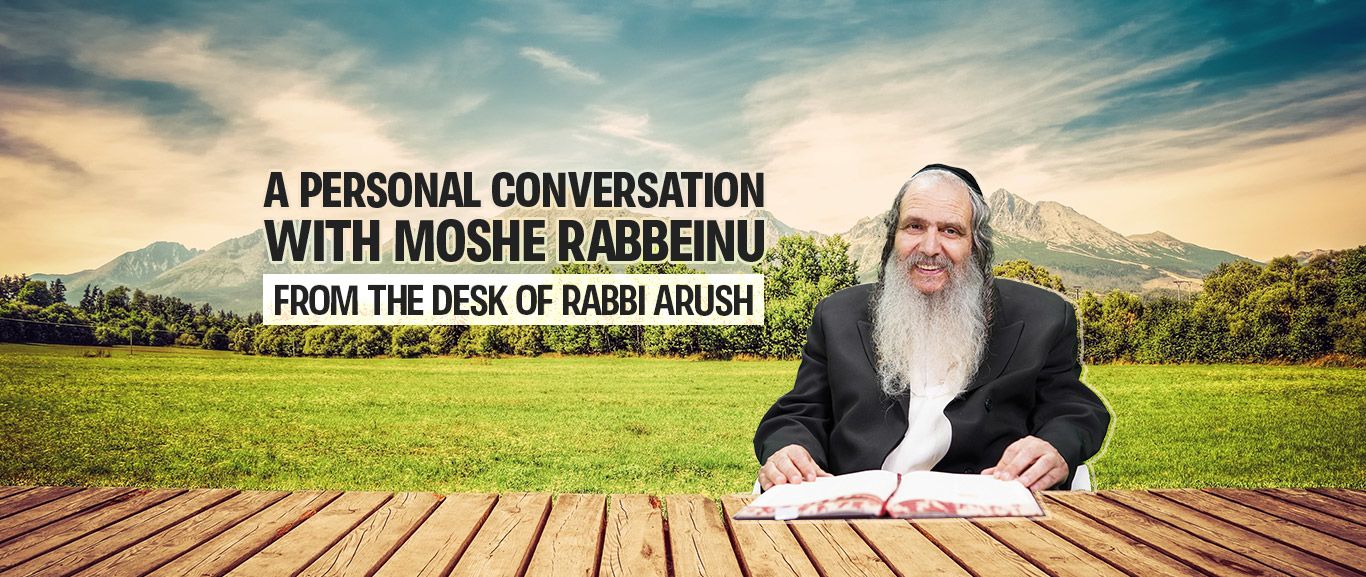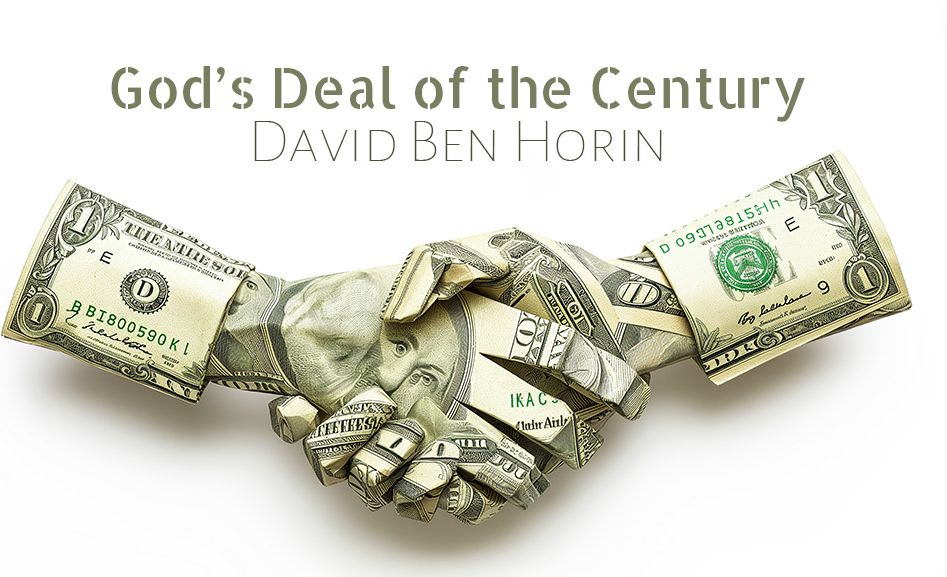
A Personal Conversation with Moshe Rabbeinu
Date of Passing: 7-Adar. Imagine sitting down face-to-face with Moshe Rabbeinu. What personal path would he advise you to go on? What would he say to all of us in these days of upheaval?

Translated from Rabbi Arush’s feature article in the weekly Chut shel Chessed newsletter. The articles focus on his main message: “Loving others as yourself”.
Sweet but Painful
When a father begins a personal conversation with his son with “What happened today in school?” – the child knows he is in for it. The father is already telling him off. He knows what happened, and the son has been expecting this. The boy will apologize, promise, and the wave will wash over him. Not pleasant, perhaps, but it’s part of the game.
But when the father begins the conversation with, “My dear son, you know how much I love you, how much I want things to be only good for you…”, it may sound much better, but any child can tell that this conversation is going to be a very difficult and painful one – for both father and son. It’s the kind of conversation in which the son knows that it is not a matter of just apologizing, but, rather, he will have to change, work, prove himself. And on the father’s part, it’s the kind of conversation in which the father says to himself: If the child understands and internalizes just this one exchange – it will be enough.
Devarim as Opposed to Ekev
Parshat Devarim starts with rebuke. In the very first posuk of sefer Devarim, Moshe is really telling Bnei Yisrael: “B’nei Yisrael, do you remember what happened here, and here, and there? Very good. Let’s talk about it.” B’nei Yisrael takes a deep breath and accepts the admonition. They understand that they have made mistakes.
But parshat Ekev begins so sweetly that it is worrisome. Read the first psukim: so many promises, so many blessings; unending, constant blessings, verses full of love, reminders of all the past miracles and pampering. The many psukim list great promises of a wonderful, rose-tinted future.
It is inevitable that what’s coming will be hard and painful. These are the things that Moshe really wanted to pass on to the Jewish people. It is as if Moshe said to B’nei Yisrael: “If you take only one thing from me – I want it to be this.”
It is hard to say such a thing about the Torah, but the parsha itself says it almost explicitly: “And now, Yisrael, what does Hashem ask from you? Only to fear”. In other words: B’nei Yisrael, I don’t want you to miss this point, so I will say it explicitly. Hashem wants only one thing from you: yirat Shemyaim – fear/awe of Heaven.
The Secret of Our Existence
Actually, the entire parsha is only a commentary on that sentence, and it is in this light that it is possible, even necessary, to learn the entire parsha. But we will try to make one important point.
Last week, we wrote in What Does the Creator Pray For? that Hashem yitbarach (may He be blessed) is excited, so-to-speak, when B’nei Yisrael understand that they need Moshe Rabbeinu as a go-between to tell them the word of G-d. Hashem prays, “May their heart remain theirs, to fear Me.” “Now,” says Hashem, “you have finally reached the point that is the key to fear of Heaven.” And it is so important that Hashem Himself prays that this state will last forever. If it will, you are in the saddle, riding on the wave of success on the way to upholding the rest of the posuk: “so that it will be good for them and their children forever.”
In our parsha, Moshe explains to the Jewish people another, deeper, point: It is not only that the entire Torah is yours, and that your entire connection with Hashem is through your leader – but, rather, your very existence is dependent on Moshe, for you sinned repeatedly, and Hashem wanted to destroy you – no less! We were threatened not just with heavy punishments and plagues, but with complete destruction – may it not come upon us – and Moshe Rabbeinu gave his all and prayed endlessly until Hashem was appeased. So, the physical existence of the Jewish People depends on Moshe. Without Moshe, there is no Jewish People!
It is Not Enough to Remember
Moshe lists all the sins and emphasizes repeatedly: “You have been rebels against Hashem since the day I knew you.” This is a very heavy accusation. Moshe did not say it to get it off his chest nor to make them despair; he said it with great pain and demanded that the Jewish People recognize this harsh reality and remember it always, as the Torah commands in our parsha: “Remember, do not forget how you angered Hashem your G-d. “And, of course, the idea is not only to remember what happened in the past, but to think about it deeply and reach the logical conclusions.
And the logical conclusions are that B’nei Yisrael need a leader like they need air to breathe. Without their leader they have no existence. And yet, the yetzer hara (evil inclination) of divisiveness and baseless hatred tempts them to rebel against the leader, tire him out, question his authority, criticize him – and thus cut off the branch they are sitting on.
And therefore, when Moshe Rabbeinu reminds the Jewish People of two great miracles that were performed for them, he mentions the Splitting of the Sea and the earth opening up and swallowing Korach and his cohorts – a splitting of the sea and a splitting of land.
The Splitting of the Sea was the greatest miracle – five times more so than the Ten Plagues’ miracles all together.
And through the Splitting of the Sea, B’nei Yisrael came to believe not only in Hashem but also in His servant, Moshe. The Splitting of the Sea was a miracle that brought the Jewish People to heights and perfection of emuna (faith).
In the episode of Korach and his cohorts, B’nei Yisrael lost their faith in Moshe and that was the lowest point of the Jewish People as a nation, and therefore they needed a second great miracle to stop the deterioration of their faith.
And that is the greatest rebuke: How is it possible after the Splitting of the Sea, to believe contentious people who are contradicting the tzaddik?
The rebuke of the parsha is not only about what the Jewish People did against the Creator of the world; Moshe had already rebuked them for it in parshat Devarim. But the main rebuke of our parsha is about their ignoring the agent of the Creator of the World, who is the agent being sent to redeem them and save them, and – mainly – to guide them on the right path.
Illuminating the Simple Understanding of the Mitzvah
That is why the Torah commands us, at the end of the parsha of yir’a: “You shall fear Hashem, your G-d and cleave to Him.” The simple understanding of this posuk is that we should fear Hashem and observe His mitzvahs; it is a commandment relating to the relationship between man and his Creator. But our holy chachamim read the posuk differently and tell us that the mitzvah in this posuk is to connect oneself to talmidei chachamim, to Torah scholars, so that we will walk in the way of Hashem!
How can Chazal change the plain meaning of the posuk, taking a posuk that is talking about the Creator and making it apply to flesh-and-blood human beings?
But Chazal really did stick to the general message of the entire section, which rebukes the Jewish People not only about sins against Hashem, but also about ignoring a man of G-d who was among them. And therefore, the main simple message is actually to cleave to the scholars, because as a result of that one merits fear of Heaven.
This is a mitzvah from the Torah that is brought in the Sefer HaChinuch. And that is the main message of the entire parsha:
The Jewish People must connect to tzaddikim, and not only in order to merit miracles and salvations, and not only in order to hang their pictures at home. Rather, the main point is to listen eagerly to what they say and to know that all of yirat Shemyaim and the entire connection with the Holy One, Blessed Be He, depends on them, on walking in their ways, on learning from them, on witnessing their actions, and on a tremendous thirst to do all they say out of high regard, love, and submission.







8/26/2022
Really enlightening – the lowest point of the Jewish nation was not when they were slaves in Mitzrayim or even the Sin of the Gold Calf – but when they rejected Moshe’s authority. That’s really a lesson for today!